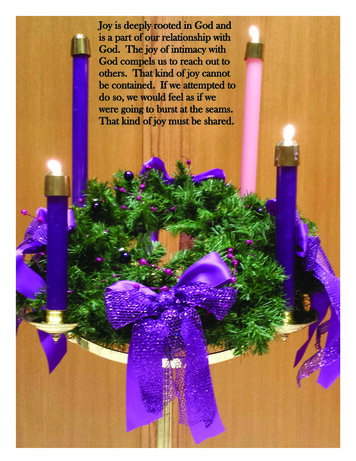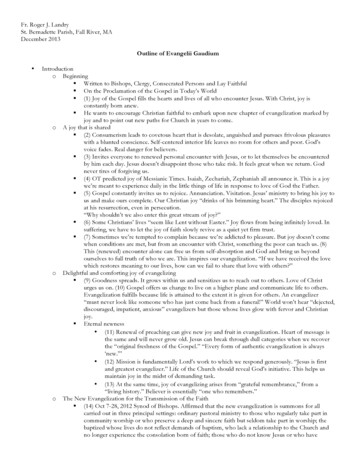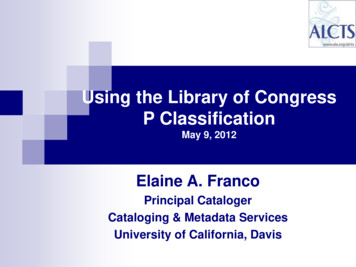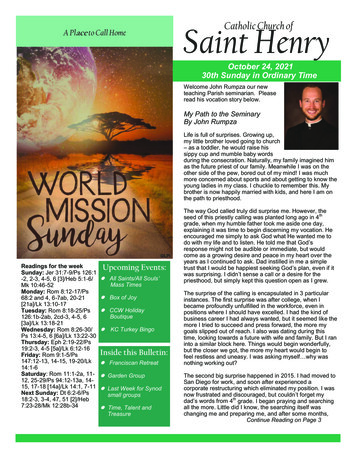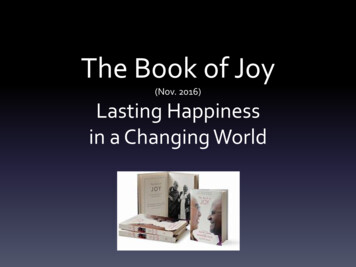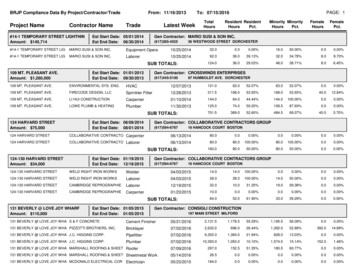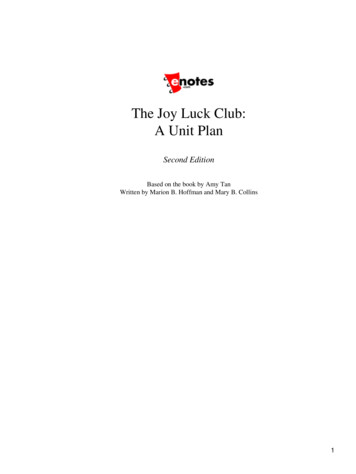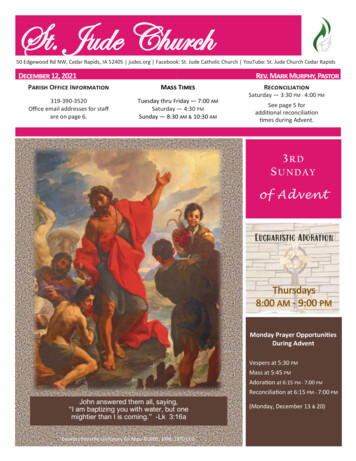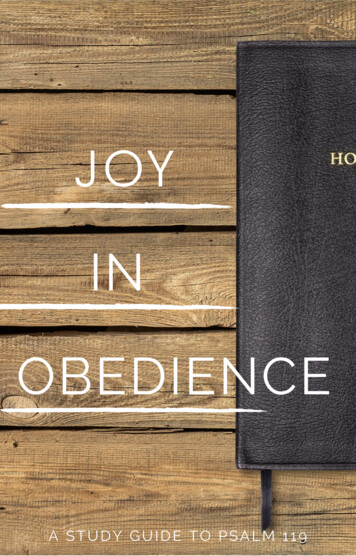
Transcription
JOYINOBEDIENCEA STUDY GUIDE TO PSALM 119
How to use this guide.This study guide is intended to assist you in engaging with God’s Word and connecting the weekly sermon withyour everyday life. We believe that discipleship happens in many ways throughout out life and this guide isdesigned to assist you in connecting with others around God’s Word in each of those ways. Of course, you mayfeel free to use as much or as little as you like of this guide. Our intention was to include as much as possible tohelp connect with the discipling environments that we experience throughout our week. You may want to printthis guide and punch holes to put it in a binder or use a journal alongside of it.At a GlanceThis section is a snapshot of the passage in a few sentences. It is intended to give you a quick overview to getyou mind set on what you are about to read.Our Current OutlookThis section is intended to consider our present circumstances and think about what challenges we face today.We live in a culture that not only ignores the Word of God but is increasingly aggressive toward those that holdonto to the truths contained within it.Sermon ThoughtsThe section for sermon thoughts is provided so that you can record your notes from the sermon or write downyour thoughts and questions about what you heard.Read and ReflectThe read and reflect section is where we begin to study the Bible for ourselves. It is intended to guide youthrough observations about the text and an interpretation of its meaning.Apply to Your LifeThis section is intended to guide us in allying the meaning of the passage in our everyday lives. It is a time tothink about how the Bible goes with us to work, home or school.
Unplugged Quiet TimeThe quiet time section is a time of prayer and conversation with God around what the passage is saying to us inour lives. This is a time to unplug and have some quiet reflection.Getting to the GospelThis section helps us see how the passage connects us to the Gospel. It is a brief statement to give us a point inthe Gospel Story to connect to.Further Reading and ResourcesThis section gives other passages to follow up on or other tools that we could reference to assist us in gettingmore out of our study.Discipling RelationshipThe discipling relationship section is intended to guide us in connecting with two others that are committed topursue obedience to the Scriptures. The questions are open-ended and static.Gather and DiscussThe gather and discuss section is intended to guide Life Groups through a discussion of the passage. This isintended to bring together around 10-12 other people in considering the implications of the passage.
Before You BeginWhat you will need 1) A Bible: This guide uses the ESV as its source Bible. The words that we point out will all befocused on the ESV version. You can use another version of the Bible but you may needto reference an ESV to see what words we are pointing to. You can get an ESV app for freeor go to www.esv.org. A study Bible like the ESV Study Bible can be a big help.2) A notebook/binder: This study is designed and formatted to be printed. However, you caneasily keep this guide in its electronic form and use a notebook to record your thoughtsand answer questions.3) A concordance: Many Bibles have a concordance in the back. This study will ask you tomake use of this resource many times. A concordance is a reference tool that shows theother places in the Bible that the particular word is mentioned. It is very helpful for gettinginsight into meaning. www.blueletterbible.org is a great resource for this.4) A dictionary: Some words used in the Bible we may not use every day. It is always a goodidea to check the meaning of any word that we do not know. In this study we will ask youto look up a word to check its meaning. Most of us have access to dictionaries online.5) A prayer journal: This is optional but we feel that having a journal to write down the waysthat God is speaking to you and guiding you is helpful. This prayer journal can span manystudies and give you a great chance to look back and see how God is moving in your life.How to study the Bible This study guide is built to introduce and encourage inductive Bible study. We want youto gain some skills that will help you in doing inductive Bible study on your own. InductiveBible study is different from other ways of studying the Bible in a few ways.1) Ask questions: Inductive Bible study asks the questions, who, what, when, where, why,and how? Digging into the Bible by asking these questions will help you see the purposeand meaning of the passage. We encourage you to ask your own questions of the text.2) Observe/Interpret/Apply: Inductive Bible study has 3 steps. First, we observe the passageas we ask questions. Second, we think about and search for the meaning of the passage.Third, we apply the meaning of the passage to our lives.3) Develop a background and outline: From these insights that we have gained we can buildan outline and describe the background of the passage. Who wrote it? Where was itwritten? When was it written? Who was it written to? What was its purpose?4) Cross References: This journey will open up other passages where the Bible speaks to thesame issues. Inductive Bible study takes these other places of scripture into account aswe understand the meaning. We want to first understand what this means in the passagethat we are presently studying and then what the rest of the Bible might say.
Study ContentsThe Blessing of Protection . . Psalm 119:1-8A Word Led Life . Psalm 119:9-16Guidance Through Difficulty . . Psalm 119:17-24Obedience in Sorrow . Psalm 119:25-32God’s Eternal Presence . . Psalm 119:33-40Led by God’s Love . . Psalm 119:41-48Your Word is My Song . . Psalm 119:49-56The Lord is My Portion . Psalm 119:57-64Better than Gold . Psalm 119:65-72Mercy and Comfort . . Psalm 119:73-80Affliction and Suffering . Psalm 119:81-88The Eternal Word . Psalm 119:89-96Loving God’s Word Psalm 119:97-104The Guidance of God’s Word . . . Psalm 119:105-112Walking by God’s Word . . Psalm 119:113-120Longing for God’s Promise . Psalm 119:121-128God’s Wonderful Word . Psalm 119:129-136God’s Righteous Word . Psalm 119:137-144God’s Word in Prayer . . Psalm 119:145-152Obedience while Waiting . . Psalm 119:153-160God’s Word is Treasure . . Psalm 119:161-168The Glory of God’s Word . . Psalm 119:169-176
Joy in Obedience: Week 1The Blessing of ProtectionPsalm 119:1-8The first section of this Psalm sets the tone for the rest of the Psalm in many ways. The psalmist is in a positionof desperation. As the writer calls out to God for help, he confesses the truth that he must be aligned withGod’s will in order to receive God’s will. So he makes a resolution within himself to live a life of obedience andacceptance of God’s commands as a way of life.In our culture today, obedience to God’s commands is met with varied response. Some go to God’s Word inthe search for blessing but never see the necessity of obedience connected to the promise of blessing. Othersare locked in to live a law to themselves. They want to relegate God’s commands to the sideline as they claimfreedom yet cry out for help in times of difficulty.Write down some of your thoughts about this week’s sermon. What stood out to you? What questionsdo you have? How is God calling you to respond?
Take some time this week to read over this week’s passage. Use these questions and the space belowto write down your observations. What does this passage mean? What words do you need to look up?Read Psalm 119:1-2What does the Bible mean when it talks about being blessed? What is included?How does someone become blameless? Is this possible? Why or why not?How does the Law of the LORD differ from other lawgivers? How does this impact ourobedience?Does the challenge of keeping God’s testimonies change our hope of receiving blessing? Why?Read Psalm 119:3-4When the psalmist says “do not wrong” he refers to wronging others or doing injustice. Doesthis change the way you read this verse? Why or why not?What behaviors are included in walking in God’s ways?What other passages come to mind when you think about walking in the ways of God?How serious is God about his commands? How do we know this?Why would God command his people to diligently keep the Law?Read Psalm 119:5-6How does the focus shift in verse 5? How can you tell?Does the desire of the writer change the feeling of demand within the Law? Why or why not?What does the writer desire in these verses?
Thinking about other places in Scripture, what would be needed for the writer to get his desire?Not being put to shame is an understatement. Look up what an understatement is.How does the use of understatement affect the meaning of not being “put to shame?”Read Psalm 119:7-8How does the focus shift in verse 7? How can you tell?What does the psalmist imagine his relationship with God will look like?What would having an “upright heart” look like?How do we learn the “righteous rules” of God?The writer uses understatement again in verse 8. Can you detect where? How does the useaffect the meaning?Observations, Answers and Thoughts:See also pages 1093-1094 of the ESV Study Bible , also available online at www.esv.org
Take some time this week to apply this week’s passage to your life right now by answering thesequestions. How does this passage impact your life at home, at work or at school? How does God wantyou to respond? Use the space below or a journal to write your answers.What are some ways that you consider yourself blessed?How have you seen obedience lead to blessing? Does obedience always lead to blessing?How does desire to obey make the demands of God’s Word feel different to you?What are some things about God’s Word that you treasure and praise God for?What is God saying to you right now?What are you going to do about it?
Take some time this week to unplug from distractions and listen to God’s voice in his Word. Read overthis week’s passage listening for God to speak to your heart. Pray through the passage using thefollowing pattern. Use the space below or a journal to write your answers.Identify the one verse or phrase that stood out to you this week. Read over it a few times.What does this verse or phrase say about who God is? Pray and tell God.What does this verse say about what God has done? Pray and thank God.What does this verse reveal about who you are? Pray and confess to God.What does this verse command you to do/change? Pray and commit to God.Spend a few minutes each day this week telling God about these things and thanking him forwhat you have discovered.Prayers and Answers to Prayer:The longing for blessing in the hearts of God’s people has been placed there by God. It is the outcomeof a relationship with him. The impossibility of pleasing God is the reason that we all need the pleasingsacrifice of Jesus Christ. He was the obedient one that we might, in him, be like him by his power.
Psalm 1Psalm 19Psalm 112Deuteronomy 4ResourcesThis week, find a time to join with one other person and walk through the following together. This isnot intended for a group but rather two or three people seeking accountability and growth.What verse or phrase stands out to you?What are some things that you observe about the verse or phrase?What is going on in your life that God is speaking to in this verse or phrase?What is God calling you to do, change or confess?Based on the above response, take turns in prayer for one another.Who are you going to share about what God is doing in your life?
This week gather together in Life Group to discuss with one another the things that you havediscovered, the questions that you have or the ways that God is calling you to apply his Word to yourlife. Use the following questions to guide your conversation.How can we know if our will is aligned with God’s will?What do you think a life of obedience to God looks like today?How can we follow God’s commands in our everyday routines?How do we know when to go to the Word or when to pray or when to be still? How do we know whichmethod to use to talk to God and when to use it appropriately?What does your relationship with God look like to you? What does your relationship with God look liketo others? Is there a difference?What present behaviors or habits are keeping you from obedience to God? Are you willing to change?How do we keep from getting caught up in our “Christian checklist” while trying to follow God’scommands?How do we know the line between searching for God’s blessing and seeking a relationship with him?What do you need to change in your own life to be more like Christ?How does your relationship differ with the Father, the Holy Spirit and the Son? Do you have a differentcommunication method with each? Why or why not?
Joy in Obedience: Week 2A Word Led LifePsalm 119:9-16This section of the psalm puts our focus on a life that is lived with the Word of God in our gaze. The writerbegins with the idea of a young man seeking a pure life and then extends the thought that a life lived in suchfocus on the truths of the Word will result in delight and blessing. The writer is hopeful that he will see thesethings come to reality rather than expressing them as fact.Think about the things that our society cares about. What does it honor? Purity is not high on that list.Certainly, our culture would wince at the thought of living a pure life in accordance to the Word of God. Therehave even been Christian authors that have written books that mock the idea.Write down some of your thoughts about this week’s sermon. What stood out to you? What questionsdo you have? How is God calling you to respond?
Take some time this week to read over this week’s passage. Use these questions and the space belowto write down your observations. What does this passage mean? What words do you need to look up?Read Psalm 119:9-10What might be causing struggles for a young man to stay pure?What does the Bible mean by “pure?” Look up pure in the concordance in the back of your Bibleif you have one. Check out the online options in links below.What verses talk about being pure? What are the different meanings?What does the writer mean by guarding the pure way with the Word of God?How do we do something with a “whole heart?” What is the alternative?Read Psalm 119:11-12What is a way that we store the Word of God in our heart? Is there only one way?What is sin? Who do we sin against?In what ways does storing the Word of God keep us from sin?Who is the one teaching us according to the writer of this psalm?How would you respond differently to learning the Bible if you saw God as teaching you?Read Psalm 119:13-14How does the shift to speaking the Word of God shift your purpose for learning?What does learning the Word of God produce in the writer?
How is this different from your experience with the Word of God?The writer uses a simile in verse 14. Explain how someone would respond to having anabundance of riches.What does the writer using these feelings as an example of how he desires to feel about God’sWord say to you?Read Psalm 119:15-16What does meditate mean in the Bible? Look it up in the concordance.What verses talk about meditate/meditation? What did you learn from these other verses?What does the phrase “fix my eyes” refer to?How would you fix your eyes on what God is doing?The writer speaks hopefully in verse 16. What does he hopefully expect will happen?Observations, Answers and Thoughts:See also pages 1094 of the ESV Study Bible , also available online at www.esv.org
Take some time this week to apply this week’s passage to your life right now by answering thesequestions. How does this passage impact your life at home, at work or at school? How does God wantyou to respond? Use the space below or a journal to write your answers.What are some struggles that you have with staying “pure?”How have you seen God’s Word challenge and guide your desire to be pure?Grade your study of God’s Word on a scale of 1-10. What would you like it to be?How does God’s Word guide your time in prayer? How can you increase your praying of God’s Word?What is God saying to you right now?What are you going to do about it?
Take some time this week to unplug from distractions and listen to God’s voice in his Word. Read overthis week’s passage listening for God to speak to your heart. Pray through the passage using thefollowing pattern. Use the space below or a journal to write your answers.Identify the one verse or phrase that stood out to you this week. Read over it a few times.What does this verse or phrase say about who God is? Pray and tell God.What does this verse say about what God has done? Pray and thank God.What does this verse reveal about who you are? Pray and confess to God.What does this verse command you to do/change? Pray and commit to God.Spend a few minutes each day this week telling God about these things and thanking him forwhat you have discovered.Prayers and Answers to Prayer:The pursuit of purity is different in the scope of God’s Word than we might think. Purity or holinessinvolves justice and compassion. Jesus laid his life down in serving humanity unto death because hewas pure in heart. The Gospel is an active relationship with God that will result in purity. Now and notyet.
Psalm 25Psalm 40Proverbs 3Deuteronomy 6Blue Letter Bible: Bible Search and Study ToolsThe Olive Tree Bible App by Olive Tree Bible SoftwareLogos Bible SoftwareThis week, find a time to join with one other person and walk through the following together. This isnot intended for a group but rather two or three people seeking accountability and growth.What verse or phrase stands out to you?What are some things that you observe about the verse or phrase?What is going on in your life that God is speaking to in this verse or phrase?What is God calling you to do, change or confess?Based on the above response, take turns in prayer for one another.Who are you going to share about what God is doing in your life?
This week gather together in Life Group to discuss with one another the things that you havediscovered, the questions that you have or the ways that God is calling you to apply his Word to yourlife. Use the following questions to guide your conversation.What are some specific, tangible ways we can live a pure life?How exactly do we hide the Word in our hearts?Do we have a passive relationship with God? How can we pursue an active relationship with God?What can we do to lay down our life in service to God?What do you do to give yourself a ‘heart check’ and check your motivations and intentions?How do we extend justice and compassion to loved ones around us?How do we extend justice and compassion to our enemies?How do we extend justice and compassion to strangers?In what ways does our level of intimacy change from enemies, to strangers, to loved ones in ourrelationship with God?Are there gaps in our love and in our service to others that we need to address?
Joy in Obedience: Week 3Guidance through DifficultyPsalm 119:17-24This section of Psalm 119 shares some of the writer’s struggles and also his hope in the midst of thosestruggles. The writer turns to God’s Word as counsel and a sure foundation in the storm of his life. A trust inthe Word of God is built over time and through practice of obedience. Obedience to the Word has a residualeffect that becomes clear in the end.What is a sure foundation for us today? It seems that the intention is to tear everything down. To restart.What seems like foundational qualities to this country like democracy and capital markets are being criticizedas prejudiced and unfair. It looks like nothing can be trusted. Nothing is sacred.Write down some of your thoughts about this week’s sermon. What stood out to you? What questionsdo you have? How is God calling you to respond?
Take some time this week to read over this week’s passage. Use these questions and the space belowto write down your observations. What does this passage mean? What words do you need to look up?Read Psalm 119:17-18What does the writer expect when he asks God to “deal bountifully” with him?Does keeping the Word take time to accomplish? Why or why not?How do we see the wonder of God’s Word? What examples of this can you find in the Bible?What things would you consider as wonderous in God’s Word?Read Psalm 119:19-20Look up “sojourner” in the back of your Bible. What verses talk about this?Why would the writer of this psalm consider himself a sojourner?Does God hide his commands from some people and not others? Why or why not?The writer talks about his soul being consumed. Compare this with Deuteronomy 6:4-5.Why does the writer long for the rules (decrees) of God? How would the world change if wehad all of God’s decrees?Read Psalm 119:21-22How does the focus shift in verse 21?Look up the word “rebuke” in the back of your Bible or at Blue Letter Bible?What does rebuking accomplish?
What is the outcome of wandering from God’s Word?Does keeping God’s Word guarantee safety and blessing? Why or why not?Read Psalm 119:23-24How does the focus shift in verse 23?What does verse 23 suggest might be the source of the writer’s struggles?Where does the writer commit to place his focus in the midst of difficulty? Would this be moreor less difficult? Why?In verse 24 the writer calls the testimonies his delight? Where have we seen this before?Are the use of “statutes” and “testimonies” the same? What is the difference?Observations, Answers and Thoughts:See also pages 1094-1095 of the ESV Study Bible , also available online at www.esv.org
Take some time this week to apply this week’s passage to your life right now by answering thesequestions. How does this passage impact your life at home, at work or at school? How does God wantyou to respond? Use the space below or a journal to write your answers.How have you seen God respond to your needs? Do you turn to God’s Word for answers to yourneeds?What are some ways that you feel like a stranger in this world?How is God’s rebuke when you sin good news for you in your life?When have you turned to God’s Word for guidance in a troubling situation?What is God saying to you right now?What are you going to do about it?
Take some time this week to unplug from distractions and listen to God’s voice in his Word. Read overthis week’s passage listening for God to speak to your heart. Pray through the passage using thefollowing pattern. Use the space below or a journal to write your answers.Identify the one verse or phrase that stood out to you this week. Read over it a few times.What does this verse or phrase say about who God is? Pray and tell God.What does this verse say about what God has done? Pray and thank God.What does this verse reveal about who you are? Pray and confess to God.What does this verse command you to do/change? Pray and commit to God.Spend a few minutes each day this week telling God about these things and thanking him forwhat you have discovered.Prayers and Answers to Prayer:We have faith that God has a plan. His plan is described and displayed in his decrees. We also havefaith that God has the power to bring about the plans that he has made. His decrees are not in doubt
but they will be seen through. We don’t have a God that only talks about the Gospel but a God thatdoes the Gospel.Psalm 13Psalm 39Psalm 42Deuteronomy 27Resource ArchiveThis week, find a time to join with one other person and walk through the following together. This isnot intended for a group but rather two or three people seeking accountability and growth.What verse or phrase stands out to you?What are some things that you observe about the verse or phrase?What is going on in your life that God is speaking to in this verse or phrase?What is God calling you to do, change or confess?Based on the above response, take turns in prayer for one another.Who are you going to share about what God is doing in your life?
This week gather together in Life Group to discuss with one another the things that you havediscovered, the questions that you have or the ways that God is calling you to apply his Word to yourlife. Use the following questions to guide your conversation.How do you find hope in the midst of struggles? What ways do you cope or use self-care?What are some ways that we can build a foundation in the Word?How do we trust that foundation once it’s established? How does it need reinforcing?How can we share our foundation? How does it spread or grow?Is there ever a good time to break the rules? How do we know?How are we supposed to respond or react during times of struggle?What are we called to do as followers of Christ when others slander us and scorn us and show uscontempt?Verse 18 tells us to look for the good in God’s laws. What is the good in His commands?In what ways can we look for more of the good? How can we share God’s goodness?
Joy in Obedience: Week 4Obedience in SorrowPsalm 119:25-32This passage lays open the writer’s heart as he dwells on the sorrow in his heart and looks for relief from theWord of God. Some of the phrases suggest that the writer may be facing death or staring down the potentialfor it. The response is a turn toward that which does not fade. He turns to the firm foundation only found inthe Word that resounds through time.It is hard to find things of much depth today. Much around us celebrates the temporal and trivial. In desperatemoments we long for something more. Our souls yearn for roots. To be connected to something much biggerand much older than ourselves and our current struggles. Surely there must be something with true meaning.Write down some of your thoughts about this week’s sermon. What stood out to you? What questionsdo you have? How is God calling you to respond?
Take some time this week to read over this week’s passage. Use these questions and the space belowto write down your observations. What does this passage mean? What words do you need to look up?Read Psalm 119:25-26Look up “dust” using a concordance or in the back of your Bible. What does it usually refer to?What is the focus of the writer of this psalm in verse 25?What does the writer refer to when he says that he told God ”of his ways?”How does God answering him give us insight into the meaning of this phrase?Read Psalm 119:27-28What is the difference between knowledge and understanding?What does it say about the writer that he is asking for understanding of God’s Word?How does the focus shift at verse 28?How does the writer stating that his soul is melting give us insight into his circumstances?What does he ask for from God? Can we all ask for the same thing? Why or why not?Read Psalm 119:29-30What would be included in “false ways?”How does the teaching of God display grace to us?How does the choice of the writer in verse 30 display his understanding of God’s character?What does the writer put his focus on as a result of his faithfulness?
Is this choice a one time decision? Why or why not?How does God respond to us when we fail to put his rules in front of us?Read Psalm 119:31-32What do you imagine when the writer uses the word “cling?”How do we cling to the Word of God? What tries to pull it away from us?The writer has used the word “walk” many times, does his use of “run” point to somethingdifferent? Why or why not?What will it take for the writer to “run” in the way of God’s Word?Observations, Answers and Thoughts:See also pages 1095 of the ESV Study Bible , also available online at www.esv.org
Take some time this week to apply this week’s passage to your life right now by answering thesequestions. How does this passage impact your life at home, at work or at school? How does God wantyou to respond? Use the space below or a journal to write your answers.When have you been desperate to hear from God in his Word?How have you gone from knowledge to understanding? What was the difference?What is a concrete way that you have seen God’s grace in response to a poor choice or decision?Grade the importance of God’s Word in your life from 1-10. What would cause it to increase?What is God saying to you right now?What are you going to do about it?
Take some time this week to unplug from distractions and listen to God’s voice in his Word. Read overthis week’s passage listening for God to speak to your heart. Pray through the passage using thefollowing pattern. Use the space below or a journal to write your answers.Identify the one verse or phrase that stood out to you this week. Read over it a few times.What does this verse or phrase say about who God is? Pray and tell God.What does this verse say about what God has done? Pray and thank God.What does this verse reveal about who you are? Pray and confess to God.What does this verse command you to do/change? Pray and commit to God.Spend a few minutes each day this week telling God about these things and thanking him forwhat you have discovered.Prayers an
How to study the Bible This study guide is built to introduce and encourage inductive Bible study. We want you to gain some skills that will help you in doing inductive Bible study on your own. Inductive Bible study is different from other ways of studying the Bible in a few ways. 1) Ask questions: Indu

